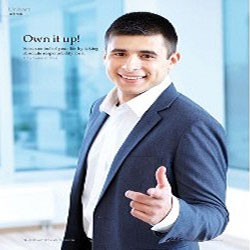“Sameer, I really am confused! Shall I take up a job or ensure my kids do well in school by being at home and taking care of their needs” said one of my coaching clients. This had been the state with this lady not being able to make up her mind for over 2 years.
Another person I met at a training program stated, “I have been thinking about setting up a business for over a year and a half. I cannot decide what to do. What do you suggest?”
I hear people regularly say that they are confused. Confusion to me is an indulgence; a great place for some people to be because it gives them an excuse for taking no action. “I am confused and if I am confused, how can I take any action? I need clarity before I can take any action!” said one of the students in a placement meeting at the business school that I used to head.
Confusion leads to inaction and inaction in turn leads to further confusion. This is a vicious circle that you want to avoid. Once you get into the mode of confusion, there is only a downward spiral from there on.
I have noticed this about my life. Every time I have been confused, I realise I have been inactive. Even if it is for a few moments. The key is to brand my inaction as inaction. That way you know you are not in action for the sake of it. And that to me is perfectly ok. There have been days I just haven’t felt like working. And I prefer saying it as it is – that I don’t feel like working today.
In my interactions with several working executives, I notice they romanticize their inaction by calling it confusion. Once you have branded your inaction as confusion, you now have a very good reason for remaining in inaction. ‘You are confused after all! And how can confused people ever be asked to take any action’. Here starts the never ending downward spiral of confusion and inaction.
Here’s something else for you to consider:
Confusion = Irresponsibility
Being responsible is being chargeable for being the author; for being the cause. You simply cannot cause anything in the state of confusion. To be the cause, you need to have clarity, distinctiveness; and clarity and distinctiveness are functions of action. How many times have you noticed that clarity automatically emerges when you take that elusive first step. Which is why, I have no hesitation in stating that confusion also means irresponsibility. Meaning thereby that you are not ready to take responsibility for the way things are right now and do what is required to be done to make the situation the way you want it to be.
Recently, while travelling with a friend in his car, we came across a junction where the traffic lights had just stopped working. Cars from all directions had started to create a jam and in a very short while, it became a deadlock. Imagine this picture of the deadlock and now consider this to be the state of mind of a confused person.
I got off the car, identified one car (some one else in my place may have identified another car – the point is not which car, the point is one car was identified) and asked that car to back up. As soon as that car backed up, another car from the opposite direction was able to move. With this, a little space got created and gradually the traffic opened up and we were able move past that jam in a few minutes. This traffic jam could otherwise easily have lasted an hour or so.
So, the next time you are confused, consider doing the following:
• First and foremost, notice that you are not in action. Remember, inaction will lead to confusion and worsen it.
• Rephrase, “I am confused” to “I am not in action currently” – means the same thing, however the first statement gives you an excuse to remain in inaction, while the second statement acknowledges that you are not in action and that you will soon get back into action.
• By action, I don’t necessarily mean doing things physically. Applying thought is also being in action. Get into action, start evaluating options if you are fortunate to have many of them;
• And finally, take that first step. Remember, from the story above, it does not matter what that first step is (which car is asked to move first). Take that step! Different people will take different first steps. And that is perfectly ok.
Keep in mind – those who take responsibility for their lives do not get confused. They are the cause of clarity in their lives and in the lives of others around them. And in those rare moments of confusion, they jump right back into action.
Sameer Dua, Founder Director, Institute for Generative Leadership, India
Schedule a Conversation
Please help us with your details.







